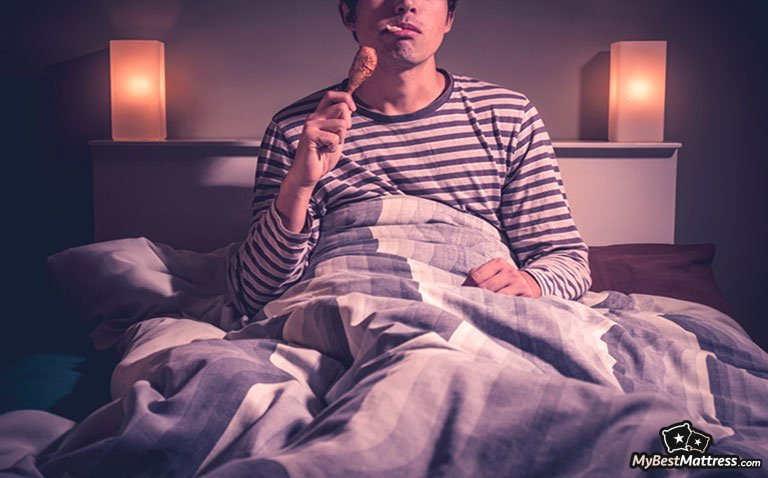
You probably hear about sleep talking all the time, however, what you don’t know is that it can signalize more serious issues than it might seem in the first place.
The main questions to ask are as follows.
Do you wake up in the middle of the night and hear your partner sleep talking?
Or maybe someone heard when you were talking in your sleep?
In both cases, I’ll help you to solve this problem.
In this guide, you will find extensive information on talking in your sleep - what it is, why it happens, and, of course, how to stop sleep talking. Thus, move further and reveal all the answers.
What does talking in sleep signal about the human body/health?
Talking in sleep can be completely benign, but sometimes it can be caused by mental illness such as depression, or generally feeling stressed. Sometimes sleep talking may indicate a sleep disorder. Most commonly, it can simply be a consequence of sleep deprivation, having the flu, or drinking alcohol before bed.
Table of Contents
- 1. Talking in Your Sleep: What is That?
- 2. When Does the Sleep Talking Appear?
- 3. Severity and Duration of Sleep Talking
- 4. Why Do People Talk in Their Sleep? The Main Causes
- 5. How to Stop Sleep Talking? Tips That Work
- 5.1. Tips for the “Sufferer”
- 5.2. Tips for the Talker
- 6. When Should You See a Doctor?
- 7. For Your Interest
- 8. Conclusions
Talking in Your Sleep: What is That?
What most of you know as talking in your sleep actually has a formal name “Somniloquy”. It is a parasomnia (sleep disorder) that refers to talking aloud when you’re asleep. People who experience this sleeping disorder, do not remember sleep talking in the morning.
You should know that sleep talking doesn’t necessarily mean speaking in a clear manner. Most often people produce the sounds of mumbling, moaning, calling out, and even whispering. Thus, they don’t have any specific meaning, so you won’t be able to understand what the person is saying (in most cases).
Based on the research performed by the American Academy of Sleep Medicine, sleep talking occurs in about half of young children and only 5% of adults[1]. More men experience this problem compared to women.
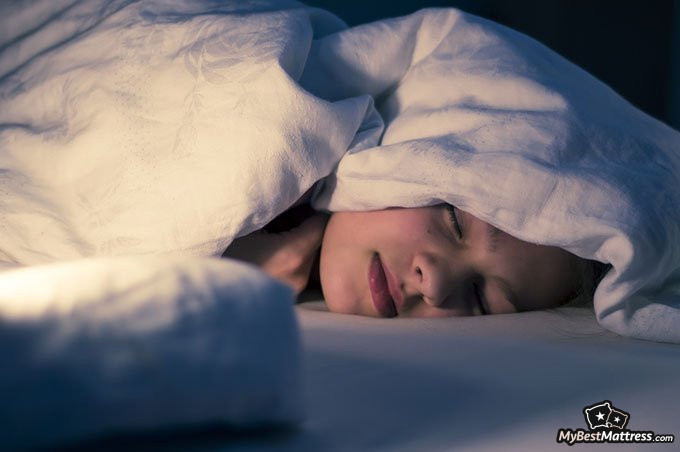
Since sleep talking occurs frequently in children, there’s no need to worry if your child experiences this sleep disturbance. He or she will simply grow out of it.
In the last few decades, the researchers increased the knowledge about cognitive processes and behavioral manifestations during sleep significantly. On the other hand, It’s obvious that there’s still a huge knowledge gap regarding sleep talking.
But let’s move further and discuss what’s already known about talking in your sleep.
When Does the Sleep Talking Appear?
Before explaining when the sleep talking appears, I want you to understand the sleep cycle and how it works. These two aspects strongly correlate with one another.
The sleep cycle is the fluctuation between the slow-wave and REM phases of sleep. One cycle takes about 90-120 minutes, so, it will repeat itself 4 or 5 times during the night, depending on how long you sleep.
There are five stages of sleep cycle:
- Stage 0 - you’re awake.
- Stage 1 - light sleep, you’re falling asleep.
- Stage 2 - light sleep.
- Stage 3 - deep sleep, the most important for all body restorative functions.
- Stage R - REM sleep, most vivid dreams appear, your body does not move.
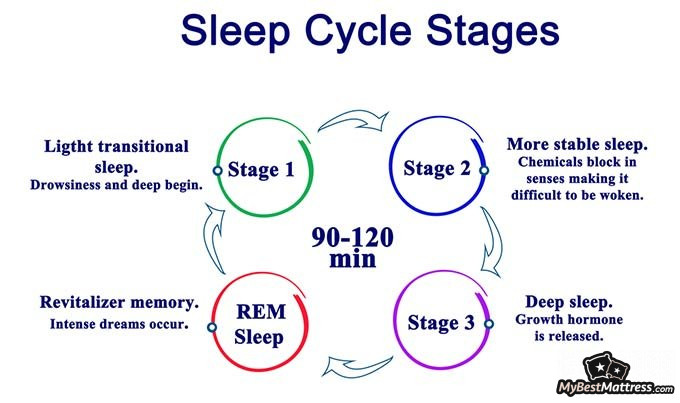
Based on the “Therapy in Sleep Medicine”[2] written by Carlos H. Schenck, Thomas D. Hurwitz:
“Parasomnias that affect the skeletal motor system can occur in either REM or NREM sleep. In NREM sleep, these parasomnias (e.g., sleepwalking, sleep talking, teeth grinding, and night terrors) are mainly seen in young people, and reflect motor responses to the outputs of central motor pattern generators.”
When sleep talking appears during the REM stage of sleep, people tend to speak out loud as if they’re speaking as a character in their dreams.
Talking in your sleep often appear during the transitioning stages when you’re half awake and move from one stage of non-REM sleep to another. Thus, since sleep talking tends to appear when we’re half-awake, it allows us to make sounds/speak, however, we do not make much sense of it.
If you’ve experienced talking in your sleep before or heard this happening to someone else, you may have noticed that this phenomenon lasts only for a few seconds. This happens because it appears during the overlapping states of mindfulness.
What’s important to understand is that the words people are talking while sleeping shouldn’t be taken literally - it’s not your conscious and rational mind.
Severity and Duration of Sleep Talking
Sleep talking can appear in any stage of sleep, however, as I said, in stages 1 and 2 logical conversations can be produced, whereas, in stages 3 and 4, the sleeper produces can only mumble.
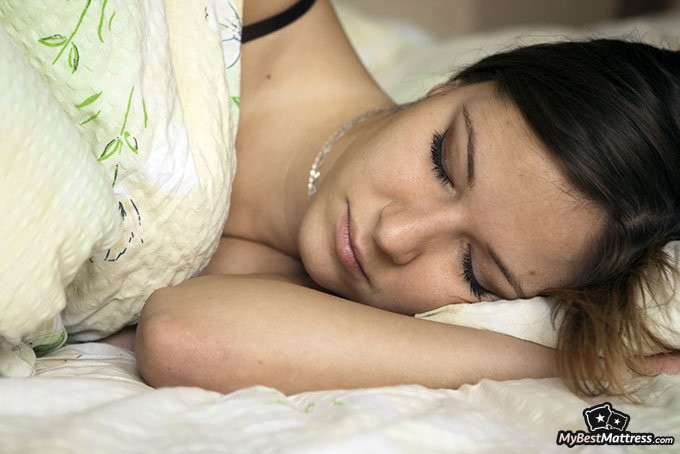
Each sleeper can experience sleep talking of different severity and duration. The severity can be:
- Mild - talking in your sleep appears less than once a week.
- Moderate - sleep talking appears more frequently than once a week, however, it does not repeat every night. Also, your partner might feel the disturbance.
- Severe - sleep talking appear every night, your partner might be experiencing difficulty to fall asleep and feel frequent interruptions.
The seriousness of the sleep talking can be also evaluated based on the duration:
- Acute - continues for 1 month or even less.
- Subacute - continues from 1 month to 1 year.
- Chronic - lasts longer than 1 year.
Even though some people might experience sleep talking for only a short period of time due to the sudden stress or changes in their lifestyle, others can suffer from this problem for a year or even longer, and it can turn into a chronic disorder.
Thus, the severity and duration of sleep talking can be helpful at understanding how serious this problem of yours is, and encourage you to make changes.
Why Do People Talk in Their Sleep? The Main Causes
Even though the knowledge gap still exists, as far as it’s known, talking in your sleep can be caused by:
- Depression
- Sleep deprivation
- Stress
- Day-time drowsiness
- Fever
- Alcohol

What is more, sleep talking often runs in the blood. If your parents experience this problem, then there’s a possibility that you will be/are talking in your sleep as well.
Moreover, talking in your sleep often appear together with other sleep disorders, such as:
- Confusional arousal. It can appear when you’re falling asleep, sleeping, or waking up. You might wake up confused, disoriented, unresponsive and even find it difficult to sleep. Confusional arousal can last from a few minutes to a few hours.
- Sleep apnea. It’s a sleep disorder that can be dangerous - your breathing repeatedly stops and starts. If you’re a loud snorer then you might be suffering from sleep apnea.
- Nightmares. We have all been there. Nightmares are terrifying dreams that cause feelings of fear, anxiety, and terror.
- REM sleep behavior disorder. It’s a parasomnia of unknown cause, although, widely associated with alcohol. This disorder leads to people acting out on their dreams.

As I said, children experience sleep talking quite often and that’s completely normal, however, when it occurs for people over 25, it’s more often associated with mental and medical illnesses.
How to Stop Sleep Talking? Tips That Work
Depending on how loud you or your partner sleep at night, you might want to try some tips that can help to make this sleep disorder less noticeable.
Tips for the “Sufferer”
- Invest in a “quiet” mattress. Some beds are more noise-reducing than others. Typically, light sleepers do not choose innerspring and hybrid mattresses as they do produce some sound when your partner is moving. I recommend choosing memory foam or latex mattresses that are the most sound-absorbing.
- Purchase noise-reducing products. Nowadays, there are various products that can help minimize the noise when you sleep. For example, you can try the white noise app for your phone. It can mask all the other sounds that occur naturally in your environment.
Latest Saatva Coupon Found:
UP TO $500 OFF
Limited-time Saatva Sale
We're sharing a limited-time Saatva mattress discount with our readers! Grab this deal & enjoy your new mattress with huge discounts.
Tips for the Talker
- No more drugs and alcohol. It’s been proven that drugs and alcohol interfere with your sleep and health overall, and they can also be the cause of sleep talking.
- Less stress. Since stress is one of the causes of sleep talking, by minimizing the stress, you can make talking in your sleep either less significant or manage to get rid of this problem completely. Try calming activities before going to sleep and during the day, such as reading a book, listening to calming music, meditating, and so on.
- Get more sleep. Since sleep deprivation is widely related to talking in your sleep, you can solve this problem by getting more rest.

When Should You See a Doctor?
If you’re suffering from severe sleep talking and none of my tips help, you should know that it’s time to see a doctor.
As I mentioned previously, sleep talking is widely associated with children, about half of them talk in their sleep. Even though you shouldn’t be worried about this problem normally, when sleep talking is associated with a night terror, nightmares, physical fear, REM sleep behavior disorder (explained above), then it’s time to visit a doctor.
It’s the same for you, if talking in your sleep is associated with the mentioned conditions such as nightmares, physical fears, and others, then it’s time to go to the specialist for a consult.
Even if talking in your sleep is not associated with certain dreams or fears, it wouldn’t hurt to see your doctor. He/she might find that your sleep talking might be caused by the stress at work or at home, or the usage of certain medications.

To make the best of the visit to the doctor, you should record when you go to sleep, when you wake up, and ask your family members to mark when talking in your sleep appears, how often you wake up and other related information such as your mood, diet, exercises, and so much more.
All this information will help your doctor to better understand the situations answer your question - “how to stop sleep talking?”.
For Your Interest
I found that people who talk in their sleep can sometimes start speaking in another language. Even though it’s super common, this phenomenon is called the "different-language sleep-talk".
Different-language sleep-talk is currently under extensive research in various locations around the world, including New York City and San Diego.
The different-language sleep-talk is most likely to be in the language that a person learned at his young age. However, it can also be his second language. I know what you're thinking, and the answer is no - sleep talkers cannot speak in a language that they don't know.
This phenomenon usually appears in teen to adulthood and most often range from 17 to 26 years. Even though it’s not proven to be dangerous but you shouldn’t wake the person up when he’s sleep talking. Wait until he wakes up to discuss this problem.
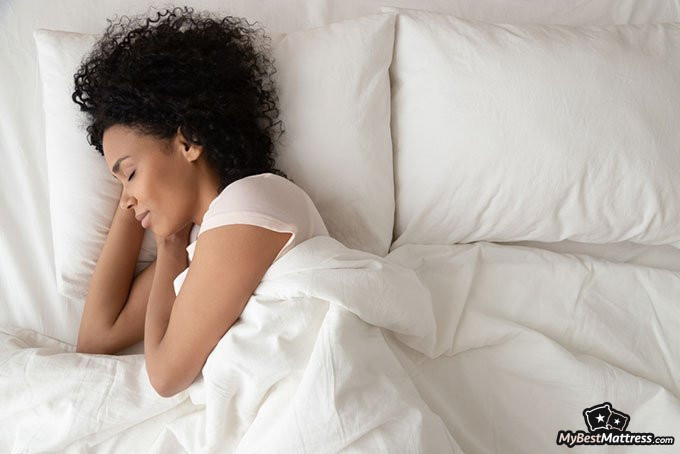
Therefore, all the aspects concerning sleep talking should be clear by now. So, let’s move to the conclusions.
Conclusions
Therefore, while talking in your sleep may not be harmful, only unpleasant for your partner, there are some serious conditions that are widely related to somniloquy. That includes depression, sleep deprivation, stress, daytime drowsiness, fever, the usage of alcohol.
Moreover, you might be experiencing sleep disorders such as confusional arousal, sleep apnea, nightmares, and REM sleep behavior disorder. So, if you’re talking in your sleep, you might be experiencing at least one of the named problems.
Even though sleep talking is not so common among adults - about 5% of them have this problem, it appears very commonly in children that are less than 10 years old - half of them speak when they’re sleeping.
The seriousness of this disorder can be evaluated based on severity and duration. If you’re experiencing sleep talking more often than once in a week, then it’s time to visit a doctor who might connect this problem to other health issues.
What is more, even though sleep talking can appear in any stage of sleep, based on the researches it’s clear that during stages 1 and 2, people speak more clearly while during stages 3 and 4, the produce only murmuring and gibberish.
If your partner is talking in his/her sleep, then you should purchase sound-reducing products, try sleeping with earplugs, install a white noise sound app that can mask all the other sounds. And, most importantly, invest in a noise-reducing mattress such as memory foam or latex.

Contributed By Patricia Celan, MD, Psychiatry Resident
Patricia is a post-graduate trainee in psychiatry, working in diagnosing and treating patients with psychiatric conditions. She is passionate about psychotherapy, especially in trauma, anxiety, and...
Read Full Bio...Scientific References
Contributed by Patricia Celan, MD, Psychiatry Resident1. American Academy of Sleep Medicine: 'Sleepwalking & Sleep Talking '
2. Teri Barkoukis Jean Matheson Richard Ferber Karl Doghramji: 'Therapy in Sleep Medicine'
Leave your honest feedback
Leave your genuine opinion & help thousands of people to choose the best mattress. All feedback, either positive or negative, are accepted as long as they’re honest. We do not publish biased feedback or spam. So if you want to share your experience, opinion or give advice - the scene is yours!










